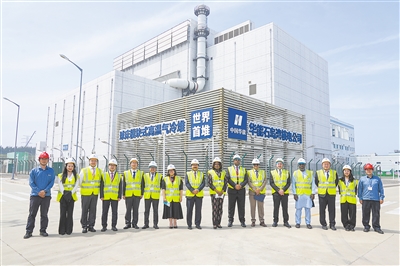
 |
| The delegation visit the Huaneng Shidao Bay High-Temperature Gas-Cooled Reactor Demonstration Project in Shandong province. (PHOTO: CAEA) |
China's leading role in peaceful nuclear applications and its cutting-edge nuclear infrastructure and research advancements were highlighted at the China Nuclear Industry Explorer (CNIE), a high-level diplomatic and technological exchange held in Shandong province and Beijing from June 22 to 27.
Co-organized by the China Atomic Energy Authority (CAEA) and the Permanent Mission of China to the United Nations and Other International Organizations in Vienna, the event was attended by senior diplomats from Ghana, Brazil, Namibia, Bangladesh, Nigeria, Pakistan, Venezuela, and Indonesia.
They also participated in the "Atom for a Better Home" roundtable on cooperation in peaceful use of nuclear technology. Officials from CAEA briefed them on China's efforts to promote safe, sustainable nuclear energy development and apply nuclear technologies to improve people's livelihoods. China's people-centered development philosophy was emphasized, demonstrating how nuclear science and technology is being applied across industries such as agriculture, medicine, environmental protection to drive high-quality economic and social development.
Claudia Vieira Santos, the designation of Ambassador Claudia Vieira Santos as Permanent Representative of Brazil to the International Atomic Energy Agency (IAEA) in Vienna, commended China's peaceful use of nuclear technology, saying it has made substantial contributions to developmental applications, such as agricultural research ('Atoms for Food'), power generation for climate change mitigation, and replacing fossil fuels.
"Additionally, the scale of China's power applications has spurred innovation, including advanced reactor models and materials, expanding options for developing countries," she added.
Toufique Hasan, Bangladesh's permanent representative to the United Nations (Vienna), echoed this sentiment. "We see China as a key collaborator," he said, expressing interest in deeper collaboration with China on education, training, and capacity building.
Matilda Aku Alomatu Osei-Agyeman, Ghana's permanent representative to the United Nations (Vienna), told Science and Technology Daily, "China is very advanced in nuclear technology. We could send our people to be trained there and share equipment. In the developing world, we lack resources. Learning from China's best practices is a practical way forward."
She anticipated China-Africa or China-Ghana collaboration would lead to more facilities and more people-to-people exchanges. "It's not just about the machines; it's also about training people to diagnose and treat diseases properly," she added.
All participating officials recognized China's achievements in nuclear science and technology and its significant contributions to advancing nuclear energy programs in the Global South.
The delegation also visited the Huaneng Shidao Bay High-Temperature Gas-Cooled Reactor Demonstration Project in Shandong province, Shandong Nuclear Power Equipment Manufacturing Co., a subsidiary of State Power Investment Corporation, National Nuclear Security Technology Center, China Institute of Atomic Energy, Chinese Academy of Agricultural Sciences, the Tongfang Weishi Industry-Academia Research Base, and China Nuclear Power Engineering Co.
The CNIE is a key step in China's ongoing efforts to enhance international exchange and cooperation in the nuclear field. It serves as a bridge for increasing understanding of China's nuclear industry and expanding bilateral and multilateral collaboration on peaceful uses of nuclear technology.
Since joining the IAEA in 1984, China has consistently stood by the rest of the Global South, safeguarding their legitimate rights to peacefully use nuclear energy and jointly promoting the application of nuclear science and technology for sustainable development.
With the vision of building a community with a shared future for humankind, the CAEA reaffirmed its commitment to deepening partnerships with the IAEA and Global South nations to promote nuclear innovation, foster inclusive global nuclear development, and expand cooperation in the nuclear industry, science and technology, and talent development.







